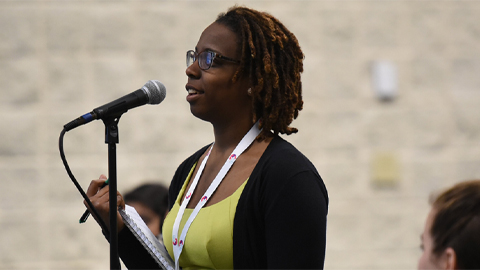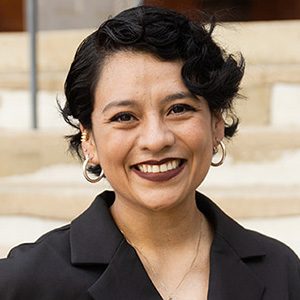
Advocacy workshops at Discover BMB 2024
Discover BMB 2024, the annual meeting of the American Society for Biochemistry and Molecular Biology, will include workshops hosted by the ASBMB public affairs team and the Public Affairs Advisory Committee on topics such as running for office, becoming an advocate and navigating the grant review process at the National Institutes of Health.
The meeting will take place March 23 – 26, at the Henry B. Gonzales Convention Center in San Antonio, Texas. As you plan your #DiscoverBMB experience, keep these events on your radar.

Beyond instruction: How to support Latinx students
Sunday, March 24, 9 – 10:30 a.m. CT (90 minutes)
This interactive workshop will help faculty learn best practices to support Latinx students and faculty at their institutions. Attendees will examine how these efforts can promote more inclusive learning environments where Latinx students can thrive.
The PAAC and the ASBMB’s Maximizing Access Committee will host this session together with the Hispanic Association of Colleges and Universities to explore equity-centered faculty development. The workshop is targeted toward all investigators and instructors as well as administrators who want to learn techniques and gain resources to support a more inclusive learning environment.
Raechel McKinley, the ASBMB’s science policy manager, is among the organizers.
“We want members to gather the skills and resources needed to best support Latinx trainees and scholars,” McKinley said, “and we want them to share what they’ve learned with peers at their home institutions.”
Demystifying NIH’s new review framework
Sunday, March 24, 2 – 3:30 p.m. CT (90 minutes)
Raymond Jacobson, division director for basic and integrative biological sciences in the Center for Scientific Review at the National Institutes of Health, will break down the simplified peer review framework, scoring criterion and the NIH’s timeline for implementation. Attendees will have time to ask questions about the impact of the new framework on grant reviewers and applicants during round table sessions.
The following scientific review officers will participate in the round tables:
- Zarana Patel, review branch: Bioengineering, Biodata, and Biomodeling Technologies
- Mufeng Li, review branch: Molecular and Cellular Sciences and Technologies
- Vandana Kumari, review branch: Macromolecular Biophysics and Biological Chemistry
- Christopher Payne, review branch: Molecular Genetics and Genomics
This workshop is aimed at senior and early-career research investigators who want to gain insight and clarity on the new framework. Participating researchers will be able to share the information they gain at the workshop with colleagues at their institutions.
From the bench to the ballot: How to run for office
Monday, March 25, 9 – 10:30 a.m. CT (90 minutes)
Attendees will be guided through an exercise to identify a problem or challenge for their community, match it to the board or policymaking body with the ability to make change and craft a preliminary pitch for this position to take into the community. Attendees will also learn how to support science, technology, engineering and mathematics candidates running across the country.
This workshop is for individuals at all career stages and backgrounds; no prior political experience is required. One of the workshop organizers is ASBMB PAAC member Sarah Smaga, who serves as the scientific conferences coordinator at 314 Action, an organization that is focused on recruiting, training and electing individuals with a background in science to public office.
Smaga joined the organization after working on cell biologist Valerie Horsley’s 2018 state senate campaign in Connecticut.
“I saw voters’ enthusiasm firsthand,” Smaga said. “They were excited about Valerie’s credentials as a scientist, about her ability to interpret data, and make decisions ... Even though we ultimately lost, I was hooked. Since then, I’ve worked with 314 Action to share the stories of scientists serving in office and inspire others to make the leap.”
Also, check out the ASBMB webinar “From the bench to the ballot: Stories from scientists who have run for office” on Feb. 21 at 2 p.m. ET. Smaga will moderate this event, which will include a panel discussion with biochemists and molecular biologists who have run for and served in elected political office.
Advocacy town hall
Tuesday March 26, 9 – 10:30 a.m. CT (90 minutes)
Learn how the ASBMB public affairs department and members of the PAAC advocate on behalf of ASBMB members with policy makers at federal agencies and on Capitol Hill (Learn more here). During the second half of this event, ASBMB members will have the floor to raise concerns the society can consider for future advocacy work.
The town hall meeting is open to everyone attending #DiscoverBMB.
Ann West associate vice president for research development and a professor at the University of Oklahoma, is chair of the PAAC.
“What we do in terms of our advocacy efforts is entirely on behalf of the ASBMB membership, so we look forward to interacting with and hearing from members at our Town Hall meeting,” West said.
“Future policymakers, especially those who are early career, are encouraged to attend to hear more in-depth about our Advocacy Training Program. They can also learn about the program at the Career Hub on Sunday, March 24, 3 – 3:30 p.m. CT.”
Enjoy reading ASBMB Today?
Become a member to receive the print edition four times a year and the digital edition monthly.
Learn moreFeatured jobs
from the ASBMB career center
Get the latest from ASBMB Today
Enter your email address, and we’ll send you a weekly email with recent articles, interviews and more.
Latest in Policy
Policy highlights or most popular articles

Women’s health cannot leave rare diseases behind
A physician living with lymphangioleiomyomatosis and a basic scientist explain why patient-driven, trial-ready research is essential to turning momentum into meaningful progress.

Building a stronger future for research funding
Hear from Eric Gascho of the Coalition for Health Funding about federal public health investments, the value of collaboration and how scientists can help shape the future of research funding.

Councilors advocate for science on Capitol Hill
ASBMB Councilors meet with their elected officials to advocate for basic scientific research funding and training the next generation of scientists.

Hope for a cure hangs on research
Amid drastic proposed cuts to biomedical research, rare disease families like Hailey Adkisson’s fight for survival and hope. Without funding, science can’t “catch up” to help the patients who need it most.

Supporting science through advocacy and community building
ASBMB calls on scientists to take action as funding cuts and policy shifts threaten the U.S. research enterprise, emphasizing the power of community advocacy and persistence in protecting the future of science.

Seven steps to advocating in your home state
Find out how to schedule, prepare for and conduct a productive district office meeting to communicate the importance of fundamental scientific research funding to your representatives.

